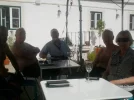Mark2012
Active Member
- Time of past OR future Camino
- Camino Frances (2012, 2014) Camino Finisterre (2012, 2013, 2014) Camino Portugues (2013), Camino del Norte (2015)
I'm going to be walking from Porto to Santiago and on to Finisterre this coming June, and I'm wondering about the language situation.
I walked the Camino Frances last year, and found that my efforts to learn Spanish in the lead-up didn't work out very well. I listened to a lot of language learning mp3s, but found that most of what I thought I had learned fell out of my head once I actually got out there. It wasn't a big deal, as invariably I was with people whose Spanish was better than mine, so I rarely had to do the talking.
Anyway, so this year I'll be walking in Portugal and Spain. So, I'm wondering what is the best way to handle the language issues. Would I be better served looking to improve my Spanish and rely on that, or learn Portuguese instead? I would try to work on both languages at the same time, but that might be overly ambitious!!!
I walked the Camino Frances last year, and found that my efforts to learn Spanish in the lead-up didn't work out very well. I listened to a lot of language learning mp3s, but found that most of what I thought I had learned fell out of my head once I actually got out there. It wasn't a big deal, as invariably I was with people whose Spanish was better than mine, so I rarely had to do the talking.
Anyway, so this year I'll be walking in Portugal and Spain. So, I'm wondering what is the best way to handle the language issues. Would I be better served looking to improve my Spanish and rely on that, or learn Portuguese instead? I would try to work on both languages at the same time, but that might be overly ambitious!!!























